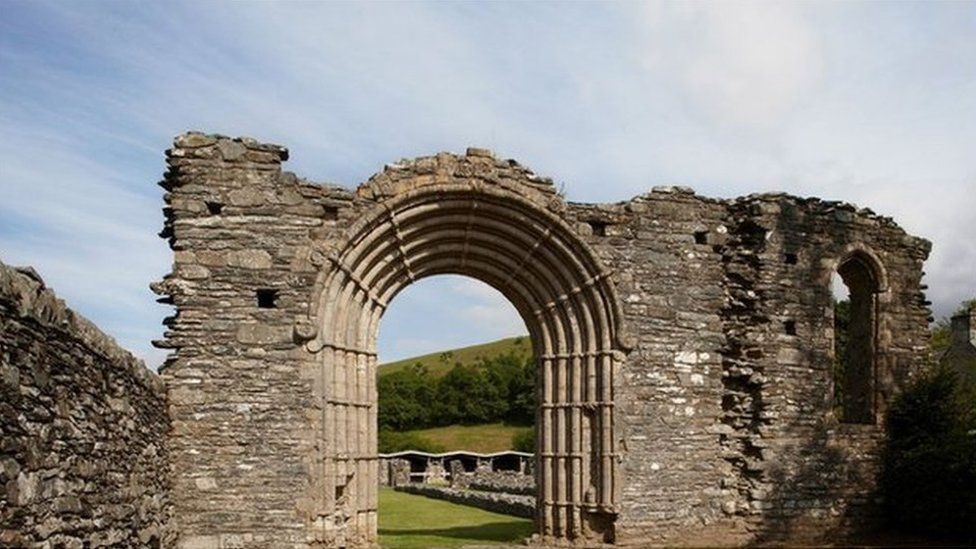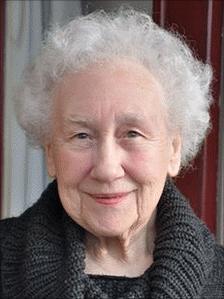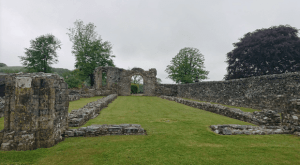The poet and writer Ruth Bidgood died in Rhayader last week, six months short of her hundredth birthday.
She never raised her voice loudly in print, and few people, asked to name five contemporary Welsh poets writing in English, would probably have chosen her. But the poems she wrote, in a steady stream over forty years, will live as a patient excavation of her adopted home, the ‘empty’ country of mid-Wales. Matthew Jarvis, in his study, considers that her poems, taken together, constitute a single epic poem in praise of that land.
Her publisher, Mick Felton of Seren Books, marks her death and celebrates her life: ‘her poems move with the seasons of the year and across the history of mid-Wales, quietly recording, sometimes almost repopulating, telling a story. Ruth was a poet with whose work people could get on. Their language is immediate, undramatic and yet dynamic.’ You can sense these features immediately in her two-stanza poem ‘At Strata Florida’.
Ystrad Fflur and the remains of its Cistercian abbey have drawn poets since the thirteenth century. Ruth Bidgood, who was a scholar as well as a poet, would have been well aware of her poems of her predecessors, Guto’r Glyn, Dafydd Nanmor, Gruffudd Gryg and more recent work in Welsh and English.
At Strata Florida
This afternoon on the edge of autumn
our laughter feathers the quiet air
in an old nave, lightly approach
old altars. Our eyes, our hands
know fragments only; from these
the Abbey climbs and arches into the past.
We look up and find
Only our own late August sky.Ystrad Fflûr, your shadows fall
benevolently still on your ancient lands
and on us too, who touch your stones
not without homage. Take our laughter
on your consenting altars,
and to the centuries borne up
by your broken pillars, add
the light weight of an hour
at the end of summer.
The register of the poem is calm and contemplative, mirroring exactly the mood that most visitors fall into when they visit the remains of the abbey. Those more familiar with grander Cistercian sites, like Fountains or Rievaulx, are quick to notice, like the poet, that rebuilding the abbey church at Strata Florida depends on a large imaginative effort by the inner eye, once you’re past the famous moulded arch of the church’s west entrance, the only part of the building to survive intact to any height. The efforts of the poet’s eyes and hands fail, once beyond the ‘fragments’ that remain; where the rest of the building should be is just ‘our own late August sky’.
For Dafydd Nanmor, in the fifteenth century, it was different. The abbey church – ‘decorated like a cuirass’, ‘with gowns of lead, enough for a hundred palaces’ – had just been repaired. The choir was equipped ‘with lovely doors of molten glass’ and fine carvings. Its windows shone anew, funded ‘by half the wealth of our island’, ‘the colour of lime water, like a great frost’. Today, for us, this sight is more than lost, it’s an unattainable vision.
Lightness – happy laughter and weightlessness – is the dominant tone in Ruth Bidgood’s response to the church in its reduced form. But there’s another, darker note in the background, an awareness of the evanescence of laughter. Just as time has shattered the glorious glass of the abbey’s windows and scattered most of its stones, so this visit is happening at the very end of summer, ‘on the edge of autumn’, with only winter to follow.
Ruth Bidgood is generally considered a poet of place, but what seems to interest her even more is the intersection of space and time – how the passing of time alters a place and the ways in which it’s possible to think about it. You’ll see what I mean if you listen to ‘Above the forests’ or ‘Hawthorn at Digiff’, read by her for the Poetry Archive, or read the thoughts of Carol Rumens on ‘Tourists’, about an eighteenth-century English traveller in north Wales.




Leave a Reply